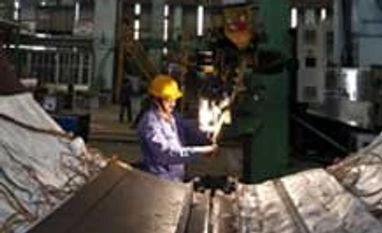China’s factory activity sputtered in December, underlining the challenges facing the country's manufacturers as they fight rising costs and softening demand in a cooling economy.
After a rough 2014, the world's second-largest economy looks set to start the new year on a weak note, reinforcing expectations that Beijing will roll out more stimulus to avert a sharper slowdown which could trigger job losses and debt defaults.
A property slump is expected to last well into 2015, companies will continue to struggle to pay off debt and export demand may remain erratic, leaving only the services sector as the lone bright spot in the economy. China’s official Purchasing Managers’ Index (PMI) slipped to 50.1 in December from November’s 50.3, a government study showed on Thursday, its lowest level of the year and clinging just above the 50-point level that separates growth from contraction on a monthly basis. Analysts polled by Reuters had forecast a reading of 50.1.
A similar private survey on Wednesday showed activity shrank for the first time in seven months in December. That survey focuses on smaller companies, which are facing greater strains, notably higher financing costs and problems getting loans.
The official survey looks more at larger, state-owned firms, which have been more resilient to the protracted downturn, partly due to generous government subsidies and better access to credit.
Many analysts expect economic growth in the fourth quarter to slow only marginally from 7.3 per cent in the third quarter, though a raft of weak data suggest that may be too optimistic.
That means full-year growth will undershoot the government's 7.5 per cent target and mark the weakest expansion in 24 years.
Economists who advise the government have recommended that China lower its growth target to around 7 percent in 2015.
After a rough 2014, the world's second-largest economy looks set to start the new year on a weak note, reinforcing expectations that Beijing will roll out more stimulus to avert a sharper slowdown which could trigger job losses and debt defaults.
A property slump is expected to last well into 2015, companies will continue to struggle to pay off debt and export demand may remain erratic, leaving only the services sector as the lone bright spot in the economy. China’s official Purchasing Managers’ Index (PMI) slipped to 50.1 in December from November’s 50.3, a government study showed on Thursday, its lowest level of the year and clinging just above the 50-point level that separates growth from contraction on a monthly basis. Analysts polled by Reuters had forecast a reading of 50.1.
More From This Section
“This indicates that industrial growth is still in a downward trend, but the pace (of declines) is slowing,” Zhang Liqun, an economist at the Development Research Centre, said in a statement accompanying the report. “The current economic situation is in the process of returning to stability from slowing down,” Zhang said.
A similar private survey on Wednesday showed activity shrank for the first time in seven months in December. That survey focuses on smaller companies, which are facing greater strains, notably higher financing costs and problems getting loans.
The official survey looks more at larger, state-owned firms, which have been more resilient to the protracted downturn, partly due to generous government subsidies and better access to credit.
Many analysts expect economic growth in the fourth quarter to slow only marginally from 7.3 per cent in the third quarter, though a raft of weak data suggest that may be too optimistic.
That means full-year growth will undershoot the government's 7.5 per cent target and mark the weakest expansion in 24 years.
Economists who advise the government have recommended that China lower its growth target to around 7 percent in 2015.
)